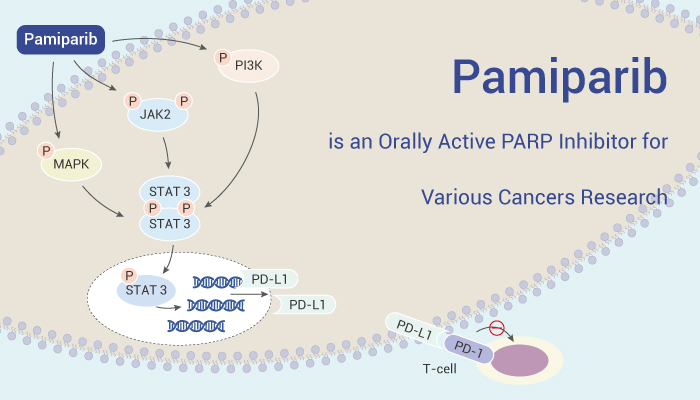Pancreatic cancer is an extremely lethal disease with a poor prognosis. Traditional chemotherapeutic agent could improve the prognosis of the pancreatic cancer. For example, poly (ADP-ribose) polymerase (PARP) inhibitor (PARPi) is beneficial for the research of germline BRCA mutations and metastatic pancreatic cancer. PARP is a ribozyme involved in base excision repair. It can transfer poly (ADP-ribose) (PAR) or mono-ADP-ribose to itself and/or other target proteins to sense and repair DNA damage. Among the PARP protein family, PARP-1 has a primary role in the total activity. Today, we will introduce a highly selective PARP-1/2 inhibitor — Pamiparib.

Pamiparib (BGB-290) is an orally active, potent, highly selective PARP inhibitor.
Pamiparib (BGB-290) is highly active both in vitro and in vivo in BRCA mutant tumors. Tumor cell lines with homologous recombination defects are profoundly sensitive to Pamiparib.
Firstly, Pamiparib has inhibitory for PARP1 and PARP2 with IC50 values of 0.9 nM and 0.5 nM, respectively. Secondly, in the cellular assays, Pamiparib inhibits intracellular PAR formation with an IC50 of 0.24 nM. Thirdly, Pamiparib shows potent DNA-trapping activity with an IC50 of 13 nM.
In addition, Pamiparib suppresses PARP activity in patient-derived glioblastoma multiforme and small-cell-lung cancer xenografts, and potentiates the effects of Temozolamide. Meanwhile, Pamiparib has good activity in patient biopsy derived small cell lung cancer (SCLC) xenograft models.
In sumup, Pamiparib has potent PARP trapping, and capability to penetrate the brain, and can be used for the research of various cancers including the solid tumor.
Reference:
[1] Wang Y, et al. Front Immunol. 2021 Dec 17;12:762989.
[2] Zhiyu Tang, et al. Cancer Research. August 2015, Volume 75, Issue 15.